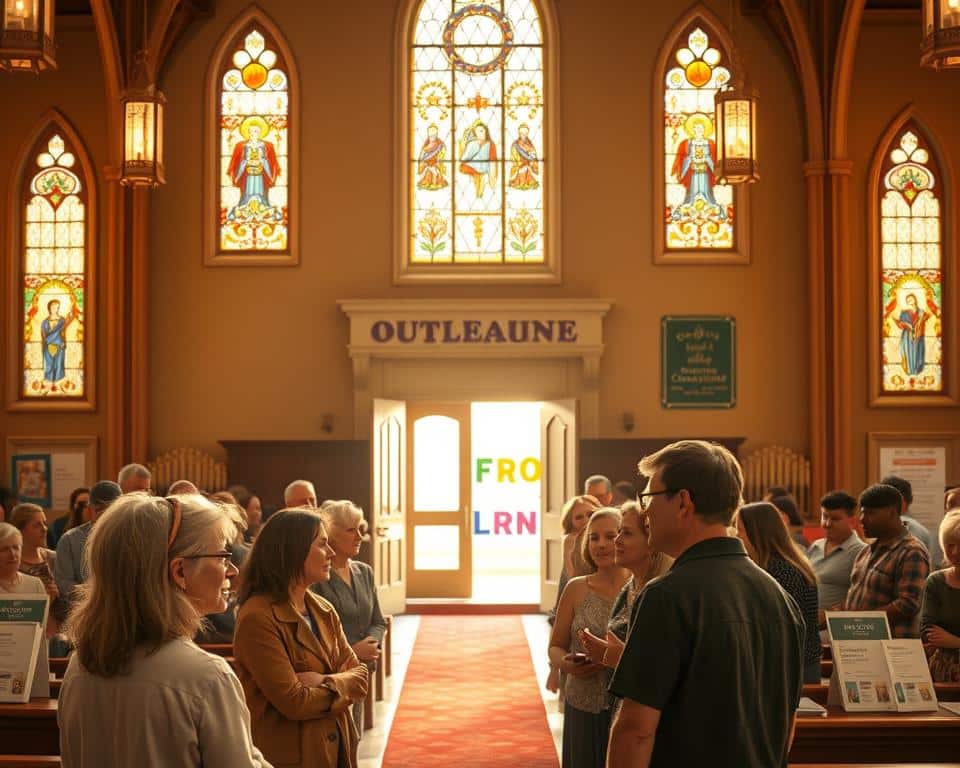Walking in faith isn’t meant to be a solo journey. God designed us for connection, and accountability groups play a vital role in keeping us grounded. When we surround ourselves with others who share our beliefs, we find strength, encouragement, and wisdom to navigate life’s challenges.
Scripture reminds us in James 5:16 to “confess your sins to each other and pray for each other.” This mutual support helps us grow closer to God and each other. Whether you’re facing struggles or celebrating victories, having trusted companions makes all the difference.
Isolation can weaken faith, but together, we stand firm. Let’s explore how these connections deepen trust, foster honesty, and reflect God’s love in practical ways.
What Are Church Accountability Groups?
Strong faith thrives when shared with others. These structured gatherings help believers stay rooted in truth and grow together. Typically, 3–4 people of the same gender meet regularly to uphold biblical principles.

Definition and Purpose
An accountability group is a safe space to:
- Confess struggles openly (James 5:16).
- Pray for healing and strength.
- Encourage one another daily (Hebrews 3:13).
Unlike casual friendships, these groups follow the Acts 2:42 model—devoted to teaching, fellowship, and prayer. Studies show such groups reduce moral failures by 80% among pastors.
Biblical Foundation
Scripture underscores their importance:
“Iron sharpens iron, and one person sharpens another.”
Meeting weekly or bi-weekly keeps members focused. This consistency builds trust and reflects God’s design for one another care.
Benefits of Joining an Accountability Group
True transformation happens when believers walk together in truth. These connections offer more than camaraderie—they provide tools to overcome struggles and celebrate victories. Here’s how these relationships strengthen faith.

Spiritual Growth and Support
Regular meetings create a rhythm of growth. Members move from confession to celebration, supported by Scripture and prayer. Studies show such engagement boosts Bible understanding by 40%.
One couple credits their restored marriage to weekly check-ins. “Hidden struggles surfaced,” they shared, “and healing began.”
Overcoming Temptation and Sin
Richard Exley wisely said,
“Temptation withers in accountability light.”
Data confirms this: those with consistent support see a 67% drop in relapse rates.
Sin loses its grip when brought into the open. Honest conversations replace isolation with hope.
Building Trust and Fellowship
Vulnerability deepens bonds. Sharing struggles and praying together fosters unmatched trust. Over time, these relationships reflect God’s love in action.
Changed lives are the best testimony. As one member put it, “I’m no longer fighting alone.”
How to Find an Existing Accountability Group
Finding the right faith-based support system takes intentional effort. Start by seeking groups that align with your values and commitment level. Here’s how to identify one that fosters growth and trust.
Ask Your Pastor or Faith Leader
Your local church often knows vetted groups. Pastors can recommend gatherings with a history of confidentiality and consistency. One Bible study formed this way has thrived for five years.
Connect with Like-Minded Believers
Look for small groups in your community or online. Shared interests—like prayer or Scripture study—create natural connections. Observe interactions before joining to ensure alignment.
Evaluate Group Dynamics Carefully
Before committing, ask:
- Do members honor confidentiality?
- Is there a structured agenda (prayer, confession, encouragement)?
- Are discussions deep or superficial?
Spend 3–4 weeks praying and attending meetings. Red flags include gossip or irregular attendance. As one member shared,
“The right group feels like safe ground for growth.”
Steps to Start Your Own Accountability Group
Creating a space for growth requires prayer, trust, and clear direction. Whether you’re leading or joining, these steps ensure your group thrives in faith and purpose.
Pray for Guidance and Members
Begin with prayer. Ask God to reveal the right people and purpose. Proverbs 15:22 reminds us,
“Plans fail for lack of counsel, but with many advisers they succeed.”
List 3–4 believers who share your commitment to truth. Invite them individually, emphasizing confidentiality and growth.
Choose Trustworthy Participants
Not everyone is ready for deep vulnerability. Select members who:
- Prioritize God’s word.
- Respect boundaries (same-gender groups reduce temptation).
- Commit to consistency (e.g., meeting each week).
Research shows groups with written covenants last 6x longer. Draft one together during your first meeting.
Set Clear Goals and Expectations
Define your goals upfront. A sample agenda might include:
- Confession (James 5:16).
- Scripture discussion.
- Prayer requests.
One leader shared,
“Our covenant kept us focused when life got busy.”
Revisit your goals every 6 months to adjust and grow.
Structuring Your Group Meetings
Effective gatherings thrive on clear plans and shared purpose. Without structure, even the best intentions can fade. Here’s how to design meetings that strengthen faith and foster growth.
Set a Consistent Schedule
Meet weekly or bi-weekly for 45 minutes. Consistency builds trust and keeps things focused. Research shows rotating leadership boosts engagement by 62%.
Follow a 5-Part Agenda
A simple template keeps discussions on track:
- Opening prayer: Invite God’s presence.
- Check-ins: Share highs and lows from the week.
- Scripture discussion: Apply God’s word to life.
- Accountability: Address struggles and victories.
- Closing prayer: Commit needs to God.
Ask Meaningful Questions
Deepen conversations with these questions:
- How did you serve others this week?
- Where did you see God at work?
- What’s one area needing prayer?
A coffee shop group used this model for 12 months. One member said,
“Rotating leaders kept everyone invested.”
Common Challenges and How to Address Them
Every faith journey faces hurdles, but facing them together makes all the difference. Even the closest members may struggle with honesty, consistency, or confidentiality. Here’s how to navigate these issues with grace and truth.
Lack of Honesty or Transparency
When trust feels shaky, gentle steps restore openness. Follow this 3-step approach:
- Confront with care: “I noticed you seemed hesitant to share last week—how can we support you?”
- Pray together: Invite God’s wisdom (Proverbs 27:17).
- Reaffirm commitment: Restate the group’s purpose: growth, not judgment.
One member admitted,
“Being asked with love broke down my walls.”
Confidentiality Breaches
Shared stories must stay safe. If a problem arises:
- Address it immediately—privately first, then with the group if needed.
- Re-sign a confidentiality covenant (89% effective in preventing repeats).
- Rebuild through accountability: Assign a “truth partner” to monitor conversations.
A restored group in Texas now thrives after a breach. Their key? Monthly trust-check-ins.
Inconsistent Attendance
Life gets busy, but 38% of groups dissolve due to spotty attendance. Try these ways to stay connected:
- Offer hybrid meetings (in-person and Zoom).
- Send weekly reminders with a verse, like Hebrews 10:24–25.
- Celebrate small wins—even showing up late is progress.
Grace, not guilt, keeps members engaged. As one leader shared, “We started meeting for coffee instead of church—attendance doubled.”
Alternatives to Traditional Accountability Groups
Faith flourishes in many forms, not just structured settings. If a christian accountability group isn’t your fit, God offers other paths to growth. Here are ways to stay rooted in truth while embracing flexibility.
One-on-One Accountability Partnerships
Deep connections often thrive in pairs. One duo met weekly for eight years, sharing prayers and struggles. Their secret? Consistency and shared goals.
Compared to groups, partnerships offer:
- Focused attention—no competing voices.
- Flexible timing (meet over coffee or calls).
- Deeper vulnerability with one trusted loved one.
Focusing on God’s Love and Grace
Daily “sin check-ins” with God show 73% effectiveness. Imagine a painter correcting mistakes as they work—God’s grace covers us the same way.
“My grace is sufficient for you.”
Try this: Each morning, ask, “Lord, what needs Your touch in my life today?”
Integrating Accountability Into Daily Life
Faith isn’t confined to meetings. Here’s how to weave it into your routine:
- Text a friend: “How can I pray for you today?”
- Journal reflections nightly—note God’s faithfulness.
- Serve others intentionally (Hebrews 10:24).
Balance human support with divine dependence. As one believer shared, “God is my first call, but my friend is my second.”
Key Takeaways for a Stronger Faith Journey
Growth in faith isn’t about perfection—it’s about progress together. Accountability groups thrive when built on three pillars: a biblical foundation, consistent practice, and grace. Studies show 91% of these groups succeed when truth and love balance.
Pastors often share how God’s word transforms lives in community. One leader noted, “We saw chains of sin break when members prayed openly.” Your life too can reflect this hope.
Remember, growth comes through connection, not flawlessness. Need next steps? Try a prayer guide or evaluation form to deepen your journey.
Hebrews 10:24–25 reminds us: “Spur one another on toward love and good deeds… not giving up meeting together.” Keep walking—together.





